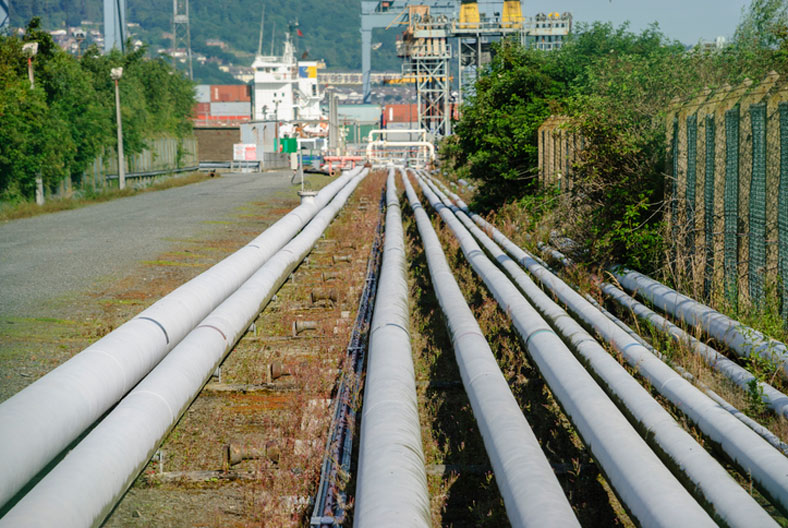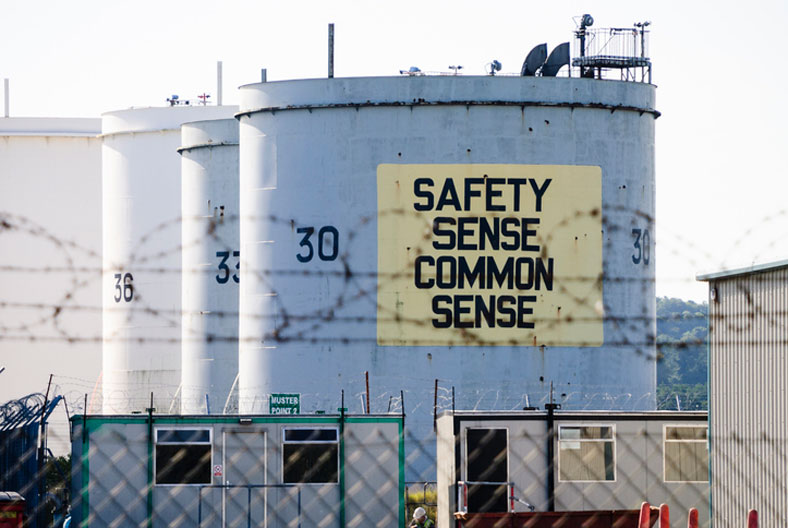Written by Scott Wilson

When most people think about supply chains, they think about parts and products getting shipped around.
What they aren’t thinking about is the fuel that is moving all that stuff. Energy, whether it’s electricity, coal, gas, oil, or something exotic like hydrogen, also has a long and often delicate supply chain behind it. That supply chain extends in either direction on both sides of the industry:
- Energy production companies rely on many specialized products, often delivered to hard-to-access locations, in order to mine for or pump out energy resources. They also have complex refinery operations that rely on a constant stream of raw materials, as well as the equipment required to turn those natural resources into usable energy.
- On the post-production side of the business, cracked petrochemicals, battery packs, coal, and electricity must be moved from factories, power plants, or refineries to the consumer. Pipelines, tankers, and vast networks of transmission lines are built and maintained to keep the deliveries flowing.
According to the U.S. Energy Information Administration, energy expenditures in the United States in 2021 were just over 5 percent of total GDP.
Conventionally, the energy industry is split into a pie of five slices:
- Power and Utilities - Generating and delivering power to end users
- Mining - Exploring, digging, and processing coal for delivery
- Chemicals and Petrochemicals - Cracking out derivative products from petroleum and further processing them into other chemical building blocks
- Upstream Oil and Gas - Exploration and production of crude oil and natural gas, including off-shore, tar sands processing, and fracking
- Downstream Oil and Gas - Refining of crude and raw natural gas into useable fuels for delivery to end users
And you might add a sixth slice today for renewables, like wind and solar.
These can all have different demands on the supply chain… everything from delivering deep sea ROV (Remotely Operated Vehicles) to Arctic drill platforms to keeping pipe sections handy for building thousands of miles of pipeline.
That means a half-dozen different, but related, industry specializations all within the umbrella of the larger energy industry. Together, according to 2022 data from the Bureau of Labor Statistics, they employ more than a million American workers.
And among those are some of the most highly paid supply chain management professionals in the country.
Running the Energy Supply Chain Is a Key Piece of Energy Costs

Fuel costs are a fact of modern life. They are particularly a fact of life in modern supply chain management. The major headaches of analyzing and estimating transport, manufacturing, and even storage costs can revolve around energy price spikes.
Within the energy industry, though, the headaches run in the opposite direction. The big concerns are all about the supply chain and its impact on production and delivery costs.
There’s a strong argument that the major component in oil and gas price fluctuations is actually supply chain constraints.
The major spikes in prices since the 1980s have largely come as the result of geopolitical instability shaking things up on the delivery side of the supply chain. In nearly as many cases, these may be intentionally engineered reductions in production by OPEC (Organization of the Petroleum Exporting Countries) and or other major suppliers.
So, energy supply chain management must take a global perspective. Supply chain managers in this business can’t keep their noses down. They need a broad understanding of international relations, geopolitics, and choke points in the supply pipeline.
The energy industry has also come under scrutiny in recent decades for its contribution to global climate change. Issues of sustainability and social responsibility are more important to ordinary supply chain managers in these businesses than most other industries that rely on effecient supply chains.
Yet some of the greatest leaps toward de-carbonizing global power sources are occurring in this same industry. So, it’s a great place for innovative and forward-thinking supply chain managers specializing in solar, wind, or tidal grid operations.
Specialized Degrees for Jobs in Energy Industry Logistics and Supply Chain Management

All the big concerns that energy industry supply chain managers face have a kind of complexity to them that is best understood through a college education in logistics and supply chain management.
As an industry that is heavily reliant on industrial engineering knowledge, four-year degrees are often considered a minimum to get into even entry-level management jobs.
You won’t often find oil and gas or energy specializations tacked onto supply chain programs until you hit the master’s level. On the other hand, you may find them in related degree programs, like a Bachelor of Business Administration with specialization in Business Analytics and Energy Management.
For graduate students, there are more options, such as:
- Master of Professional Studies in Renewable Energy and Sustainability Systems
- Master of Business Administration in Energy Management
- Master of Science in Energy Management
- Master of Science in Logistics and Supply Chain Management, Petroleum Management Track
On top of the usual range of classes in general supply chain concerns like logistics and analytics, these come with coursework that focuses on energy industry concerns, such as:
- Introduction to the Energy Business
- Energy and Environmental Law
- Global Energy Markets
- Energy Management Planning and Analysis
- Energy Risk Management
- International Energy Management

On the other hand, many, if not all, degree programs in oil and natural gas management include substantial coursework in supply chain management. That means classes in common challenges such as:
- Procurement and contract management
- Inventory management
- Storage and warehousing
- Supply chain analytics
So, you can come at acquiring your supply chain and energy systems knowledge from either angle.
There are also educational certificate programs that zoom in on various energy industry supply chain considerations. A post-degree certificate costs far less than a full degree and can be completed much more quickly. The trade-off is that it will only have a handful of classes, with a limited range. But that can be perfect if you already have a degree and just need to boost your expertise in energy SCM.
So, an Energy Supply Management Certificate or Energy Storage System Graduate Certificate can deliver specific knowledge in a very focused aspect of energy supply chains.
These educational certificates are separate from professional certifications, which are also popular in the supply chain world. Although not specific to energy logistics, supply chain management certifications in a wide range of areas can still give your career in the industry a boost.
There Will Always Be Demand for Supply Chain Managers in the Energy Industry

One huge benefit to supply chain management in the energy industry is that it’s predictable. Demand is constant within certain parameters—as long as you have the forecasts correct. Projects can be planned years in advance, in great detail.
That means that energy supply chain analysts and project managers and planners are always popular at energy companies.
And as the unfortunate lesson of the Cuyahoga River, the Exxon Valdez, and the Deepwater Horizon show, there’s always room for more energy supply chain risk managers in the industry.
Naturally, as a focal point of the transition from a carbon-based to a green economy, the energy industry also needs expert logistics sustainability managers. It’s also one of the most heavily regulated industries, so compliance managers work in the supply chain keeping companies in line with government rules and regulations.
Twenty-three utilities and forty-three mining, refining, energy production, or pipeline companies were on the 2023 Fortune 500 list of highest-revenue-generating companies in the United States.
Since it’s also an industry that has more than its share of major corporations, energy is also an industry where you will find jobs near the top. With the right education and ambition, you can land in roles like Vice President for Oil Field Services or Director of Renewable Energy Procurement.
While these jobs often involve taking on responsibilities beyond just supply chain management, supply chain considerations and strategies are always going to be at the top of their boards.
Energy Industry Supply Chain Managers Can Make Top Salaries

The energy industry is known for paying top dollar to qualified professionals. Supply chain managers in this business are no different.
The Bureau of Labor Statistics (BLS) is the agency that keeps track of various job titles, salary averages, and employment levels for American labor. They split the energy industry out into two different segments, roughly corresponding to upstream and downstream activities:
- Mining, Quarrying, and Oil and Gas Extraction
- Utilities
They also have two relevant categories of job that supply chain experts may fill:
- Logisticians - These are the front-line expert analysts, schedulers, buyers, inventory specialists, and other hands-on logistics professionals that execute supply chain operations.
- Transportation, Storage, and Distribution Managers - This category includes mid-level management positions that supervise logisticians and take care of larger responsibilities like contract negotiation and management, transportation oversight, and overall risk management.
On the production side, logisticians made an average of $88,240 per year in 2022 according to BLS. For managers, the average jumped into six figures: they pulled in $120,240 for the same year.
Of the sub-industries in the energy sector, both Oil and Gas Extraction and Natural Gas Distribution are in the top five highest paying industries for logisticians, both hitting six figures for the median salary.
In utilities, both roles do even better. Logisticians earned a median salary of $98,880 in 2022, while their managers earned an astounding $150,460.
The most senior positions fall into the category of General and Operations Managers. There’s not a clean line around these jobs, so they include senior logistics executives along with a lot of other high-level positions. But for mining and oil and gas extraction, the average pay for 2022 was $145,890, while in utilities, they earned $153,660 in 2022.
That’s before you get to bonuses and performance pay incentives, which are common in the energy industry. And it doesn’t take in benefits and perks.
One of those might be job security. In general, BLS expects an 18 percent increase in jobs for logisticians between 2022 and 2032. With the upheaval in energy markets, a significant chunk of those positions is likely to be in renewables and other critical energy supply chains.
2022 US Bureau of Labor Statistics salary and employment figures for Mining, Quarrying, and Oil and Gas Extraction and Utilities reflect national data, not school-specific information. Conditions in your area may vary. Data accessed September 2023.







